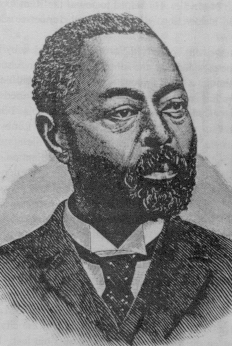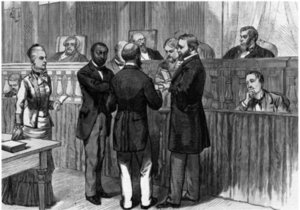Samuel R. Lowery facts for kids
Quick facts for kids
Samuel R. Lowery
|
|
|---|---|
 |
|
| Born | December 9, 1830 or 1832 |
| Died | c. 1900 |
| Nationality | American |
| Occupation | Preacher, Lawyer |
| Political party | Republican |
Samuel R. Lowery (born December 9, 1830 or 1832 – died around 1900) was an important African American leader. He was a preacher and a lawyer. He made history as the first Black lawyer to argue a case in front of the Supreme Court of the United States. This is the highest court in the United States.
In 1880, Samuel Lowery was allowed to practice law at the Supreme Court. He was sponsored by Belva Ann Lockwood. She was the first woman ever allowed to practice law there. Lowery was the fifth Black lawyer to join the Supreme Court Bar. Later in his life, he worked to help African Americans get industrial education. He also tried to start silk farming in Alabama.
Contents
Samuel Lowery's Early Life
Samuel R. Lowery was born on December 9, 1830 or 1832. He was born near Nashville, Tennessee. His father, Peter, was an African American who had been enslaved. His mother was a Cherokee Indian. Samuel's mother passed away when he was eight years old.
Samuel and his father, Peter Lowery, worked at Franklin College in Tennessee. Samuel also studied there with a Christian preacher named Tolbert Fanning. When he was sixteen, Samuel taught at a school for four years. In 1849, his father bought freedom for his family. Peter Lowery then joined the Church of the Disciples. He became the church's first Black preacher. Samuel also became a preacher.
In 1857, Samuel moved to Cincinnati, Ohio. He continued his preaching work there. In 1858, he got married. He then moved to Chatham, Ontario in Canada. He lived there for three years. After that, he returned to the United States. He moved to a farm in Fayette County, Ohio. His father had given him this farm.
Serving During the Civil War
In 1863, the Emancipation Proclamation was issued. This document declared many enslaved people free. After this, Samuel went to Nashville. He preached to Black soldiers and newly freed people there. At first, he was not allowed to be a chaplain for a regiment. But he was later transferred. He became a chaplain for the 9th United States Heavy Artillery U.S. Colored Troops. He also taught for the 2nd U. S. Colored Light Artillery U.S. Colored Troops, Battery A.
Teaching and Law Career
After the Civil War, Samuel Lowery moved his family. They went to Rutherford County, Tennessee. He kept teaching and preaching there. In 1867, Lowery and his father started a university for Black students. It was called the Tennessee Manual Labor University. It was in Ebenezer, Tennessee, near Murfreesboro. The school was based on the Franklin College model. Samuel also started studying law around this time.
The school faced problems in 1872. There were disagreements about money. Also, groups like the Ku Klux Klan caused difficulties. Lowery and another teacher, Daniel Wadkins, were Black and supported the Republican Party. They went on a fundraising trip in the North. Some white people, who were mostly Democrats, criticized the school. They felt that a successful Black school would challenge their ideas. Lowery and Wadkins were accused of mismanaging funds. They were then removed from the church. Without support, the school could not raise more money. It closed in 1874.
Lowery moved back to Nashville. He was admitted to the bar there. This meant he could practice law. In 1875, he moved to Huntsville, Alabama. On February 2, 1880, Lowery was sponsored to the Supreme Court Bar. This was done by Belva Ann Lockwood. She was the first woman to be admitted to the bar. Samuel Lowery was the fifth African American to join the Supreme Court Bar. He was also the first African American from the South to be admitted. He was the first to actually argue a case before the Supreme Court.
Silk Farming and Industry
Around 1874, Samuel Lowery's ten-year-old daughter, Annie L. Lowery, saw an exhibit of silkworms. She convinced her father to buy some silkworm eggs. Annie started raising silkworms at their home in Huntsville. She fed them leaves from white mulberry trees. Annie passed away in 1877. Samuel continued her work.
He met with other big silk makers in the United States. These included Frank Cheney and John Kyle. In 1875, Lowery started the Lowery Industrial Academy. Later, he founded the S. R. and R. M. Lowery Industrial Silk Culture and Manufacturing Company. Lowery believed that Black workers in the South would be perfect for this industry. He compared the work to picking cotton.
In 1879, Lowery was the editor of a newspaper. It was called the National Freeman in Huntsville. In 1880, he created a community in Jefferson County, Alabama. It was called Loweryvale. He spent much of his later life promoting the silk industry. He won awards for his silk at international shows. These were in Louisville in the 1880s, New Orleans in 1884, and Omaha in 1898. He also went to Washington D.C. many times. He asked the government for help for the silk industry.
In August 1900, Lowery traveled to Boston. He attended meetings led by Booker T. Washington. These meetings started the National Negro Business League. Lowery died around that year. His silk farm continued to operate until at least November 1902.
Images for kids



